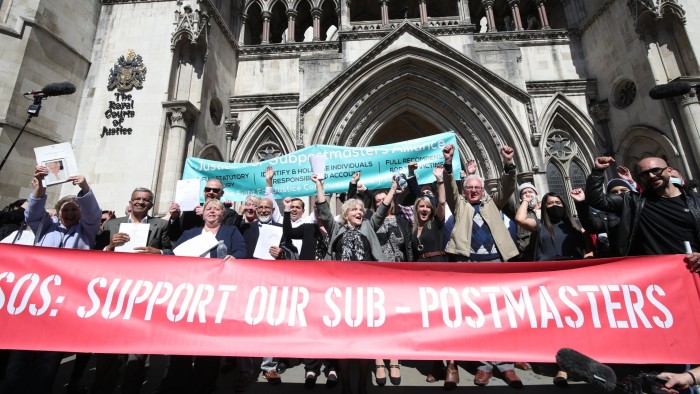Extra safeguards on Post Office-style private prosecutions to be drawn up

Unlock the Editor’s Digest for free
Roula Khalaf, Editor of the FT, selects her favourite stories in this weekly newsletter.
New safeguards on private prosecutions brought by companies are to be drawn up by UK ministers in the wake of the Post Office Horizon scandal.
The government will launch a nine-week consultation in early 2025 into the regulation of private and non-police prosecutors, the Ministry of Justice said on Thursday.
The majority of prosecutions in England and Wales are brought on behalf of the state by the Crown Prosecution Service, which brings cases that have been investigated by police. But there is also a general right in English law for any organisation or individual to pursue prosecutions without involving the CPS.
The government review will examine the role of private prosecutors, including by organisations such as Northern Rail and the Post Office, as well as prosecutions by state-run agencies such as the Driver and Vehicle Licensing Agency and TV Licensing.
Long-standing concerns about the regulation and oversight of such criminal proceedings have been compounded in recent years by high-profile scandals.
The Post Office acted as an investigator and prosecutor in hundreds of cases in which it accused sub-postmasters of offences including theft and false accounting. The convictions were secured on the basis of evidence from a faulty IT system in one of the biggest miscarriages of justice in British history, and subsequently were overturned.
Wrongful convictions for fare evasion on the railways have recently brought further scrutiny of private prosecutions. Tens of thousands of passengers were wrongly brought to court by several railway companies under a contentious “fast track” justice procedure, a court found earlier this year.
Government officials said about a quarter of the 1.3mn prosecutions commenced last year were not by the police or formal prosecuting authorities, a category that includes the Serious Fraud Office agency as well as the CPS.
Prosecutions data is not formally collated but officials estimate that non-public prosecutors brought hundreds of thousands of cases, while private prosecutors brought tens of thousands of cases in 2023.
Currently, there is a lack of scrutiny of the steps that non-police prosecutors must take before launching a prosecution, or oversight of whether such prosecutions are in the public interest.
Heidi Alexander, justice minister, confirmed plans first reported by the BBC to meet prosecutors and discuss “how we can drive up standards together”.
She said: “Fairness and transparency is a cornerstone of our justice system and the public rightly expect that every prosecution is brought in the public interest.”
The review will examine options including a statutory code of standards for private and non-police prosecutors, as well as a system of accreditation. Ministers will also consider creating a new inspectorate to scrutinise these prosecutors, alongside potential measures to enhance safeguards within the “single justice procedure” system.
The SJP was set up in 2015 to allow certain low-level offences to be dealt with privately by magistrates working from paperwork, avoiding courtroom hearings. But the system has been criticised for allowing people to be convicted without public scrutiny.
In the rail fares case, the convictions were this year found to be invalid because the SJP legislation did not permit rail companies to use it to prosecute passengers.
At a hearing at Westminster Magistrates’ Court on Thursday almost 29,000 convictions in cases brought by Northern Rail were formally declared to be a “nullity”. Further hearings covering prosecutions by other railway companies are expected.
Officials said they will also look at specific requirements for greater transparency, and measures to ensure any prosecuting organisation appropriately separates their investigatory and prosecutorial functions.
#Extra #safeguards #Post #Officestyle #private #prosecutions #drawn




